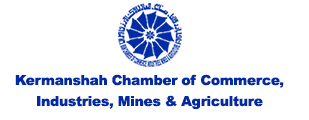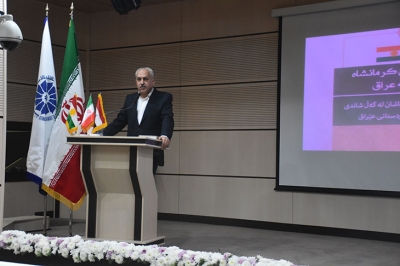He noted the long-standing relationship between Kermanshah and the Kurdish region, especially with the province of Germian, added: "Despite all the economic pressures of the last few years, the relationship between the two sectors has not been affected".
He mentioned the 51% increase in Kermanshah exports to the Kurdish climate and 65% growth to total Iraq, during the eight months of this year, and continued, "This growth reflects the good economic cooperation of two parties". A member of the board of directors of the Iranian Chamber of Commerce, believed that the dispatch and acceptance of trade between the two sides has led to an increase in trade relations and pointed out:" In these trade deals, we can make a better situation for the future relations of the two countries and use the capacities of both sides to solve the problems". The head of the Kermanshah Chamber of Commerce, referring to the establishment of relative security in Syria, referred to the country as a common market for Iran and Iraq, which should not be overlooked. He pointed out that the route of trade relations with Syria should pass Iraq, saying that this route is now from Turkey, which causes some problems.
A member of the board of directors of the Iranian Chamber of Commerce has drawn two lines, to enter the Syrian market, adding that a route from the Parvizkhan border and the Kurdistan region, and another route from the Somar or Mehran border to Baghdad and Damascus. Kashifi claimed that establishing a business relationship with Syria, needs to set up the joint shipping companies between Iran, Iraq and Syria and emphasized that," in addition to the transportation issue, the issuing of visas and the possibility for merchants commuting, as well as the establishment of a currency exchange facility for the establishment of financial transactions, should also be regarded. He went on to point out the harmonization of the procedures, that are taking place in Iraq: "We hope the problems in checking goods along the route between the central parts of Iraq will be solved, and again the border of Parviz Khan, will turn to the way for entering Goods to Iraq. The chairman of the Kermanshah Chamber continued to emphasize the need to boost the transit of goods between Iraq, Kurdistan and Kermanshah, which was launched a long time ago, and noted: "Kermanshah is a good host for Iraq, Kurdistan, in the field of tourism, and in particular, health tourism, which unfortunately We have noticed it well". He noted that:" we are ready to host specialized Iraqi groups, regarding hospitality and health tourism, to get them more information about the province's facilities.
The head of the Kermanshah Chamber of Commerce also announced that, he would be authorized to hold a Kermanshah Exhibition in Sulaimaniyah, Iraq, and reminded that this exhibition should be held at the right time, for effective producers and traders. Kashfi said that the joint investment should be established between the two sides: "We should also start importing from Iraq, which has begun working on the entry of raw materials and some items." He also mentioned the introduction of a car import procedure on the Parivaz Khan border, which is currently postponed due to problems with the car registration process, throughout the country. The head of the Kermanshah Chamber of Commerce, in the end, called for regular meetings of the governors of Kermanshah, Sulaimaniyah and Germian, to resolve the problems between the provinces. The vice-chairman of the Sulaimaniyah Iraqi Chamber of Commerce also announced the readiness of Iraq, Kurdistan to attract Iranian investors. Yasin Rahim Faraj, pointing to the good investment ground that exists in Iraqi Kurdistan said: "We welcome the presence of Iranian investors and producers in Iraq,". He argued that the conditions and rules are good for the presence of Iranian investors in Iraq, Kurdistan, which is easier than the conditions of the federal government in Iraq, he noted: Unfortunately, Iranian investors have not used these conditions well and have left the opportunities to other neighboring countries. The vice chairman of the Sulaimaniyah Chamber expressed his hope that, the exhibition will be the basis for the start of investments, especially joint investments, with the reference to the exhibition centered on the Kermanshah province in Salmaniyah, Iraq, and continued to offer discounts for the Iranian businessmen and merchants.
Rahim Faraj continued to mention the long-standing relations between Iran and Iraq, especially the border provinces of Iran, with Iraqi Kurdistan, adding that in many sectors, there are joint committees. He stated that the agreements have already been made between Iran and the Kurdistan of Iraq, he noted: "By business delegation, we are looking to update these agreements in the new economic conditions". The vice-chairman of Sulaimaniyah's Chamber also mentioned sanctions against some Iranian companies and added: "We try to have the least political impact on our economic issues." Rahim Faraj, referring to the problems that exist on the border of Parivzkhan that somewhat made tougher conditions for bilateral trade relations, called for the elimination of these problems.
Ahmad Kalari, a member of the Salmaniyah Chamber of Deputies, also mentioned the 26-year history of the Parivaz Khan border, which is now the most important trade border between Iran and Iraq, accounting for 47% of exports from both countries. He argued that this border could provide good business benefits to both sides and should not be ignored, he stressed: "the problems that exist on this border should be eliminated". A member of the Sulaimaniyah Chamber of Deputies said:" the ParvizKhan border can bring Iranian goods to Syria through the Kurdistan region.
Clari continued, saying that Iran has always been alongside Iraq, Kurdistan in difficult conditions, He added: "in the current Iran's economic situation, we are ready to provide Iran with any goods that Iran needs, through the borders of Kurdistan and its markets." The delegation is on a visit to Kermanshah province, visiting the governor, visiting major industries and participating in specialized panels in the field of building materials, oil and petrochemical industries, food, agriculture, etc.

